- Home
- Stephen Hunter
The Third Bullet bls-8
The Third Bullet bls-8 Read online
The Third Bullet
( Bob Lee Swagger - 8 )
Stephen Hunter
Stephen Hunter
The Third Bullet
I think it’s time we stop, children, what’s that sound?
Everybody look what’s going down.
–“FOR WHAT IT’S WORTH,” BUFFALO SPRINGFIELD
PART I
CHAPTER 1
Baltimore
The sidewalk before him bucked and heaved, blown askew by high winds howling through the night.
Oh, wait. No. Let’s edit that. There was no bucking and heaving. Ditto with the “blown askew” and the “high winds howling through the night.”
It just seemed so to Aptapton, because the winds that toyed with the stability of the sidewalk blew-“howled”-only through his own mind. They were zephyrs of vodka, and they’d substantially loosened his grip on the solidity of the little chunk of earth that lay between the bar he’d just exited and the house where he lived, a few hundred yards ahead.
Aptapton: alcoholic, writer, success, melancholiac, and gun guy, was in a zone that might be called greater than a buzz but less than a full staggering drunk. He was one sheet to the wind, you might say, happyhappyhappyhappy, as three vodka martinis will do to a fellow with only moderate capacity for drink, and what lay ahead, although slightly challenging, didn’t really seem insurmountable. After all, he had to walk only another few feet, cross the street, and then–
Digression. Pause for autobiographical interlude. It’s allowed when under the influence. One thing suggests another, and in this case the suggestion is appropriate.
The street was called Light, and that suggested a kind of hopeful conclusion to the evening. Light as in light of heart, light of spirit, light at end of tunnel, light as in amusing, fey, witty, light as symbol of hope and life. But also: Light as in Light for All, as a famous newspaper, located a mile or so up the very same Light Street, had proclaimed on a daily basis for 175 years or so, twenty-six of which he’d spent in its employ and where his wife to this day toiled.
Yes, he was that James Aptapton, minor local journo celeb who’d gone on to minor fame as a writer for money of hardcover books about gunfights and the stoic heroes who won them, and now he found himself at sixty-five improbably successful (in a small way) and awkwardly pleased to be himself. He had it all: beautiful wife, a couple of mil, a nice house in a fabulous part of town, a minor reputation (enough to take some pleasure in), a grand future, a munificent multibook contract, a really cool project ahead, and a lot of guns.
The reason for the three vodka martinis was liberation, not celebration. His wife was absent, ha ha ha, too bad for her. She was at some newsroom woman thing, birthday party, maybe – why did women take birthdays so seriously, by the way? – and so he’d wandered on his own to the nearby bistro, had a burger with a Bud and then V.1, which weakened his resolve to resist V.2, which shattered his resolve to resist V.3. Fortunately, there’d been no V.4, or he’d be asleep in the men’s room.
Now.
Where was I before digression?
What place is this?
Where am I now?
Ha ha ha ha.
Oh yes: home is the hunter. He. Was. Walking. Home.
The street slanted, then rolled. Ahead, it humped up, then dipped down to permit a view of the valley. It rocked. It rolled. It shook, it rattled, it coiled, it double-bubbled, boiled, and troubled.
He laughed.
Do you find yourself amusing? his wife always asked, and the truth was, yes, he did find himself amusing.
The mood, like the geography, chemically amplified by red potato crushed by kulak descendants, was quite good. That James Aptapton had been recognized. It happened. Rare, but not without precedent for your minor-league non-qual-lit celeb.
“Mr. Aptapton?”
Halfway through V.3, he’d looked up to see an earnest young fellow, possibly the assistant manager.
“I just wanted to say, I’ve read all your books. My dad turned me on to them. I really, really love them.”
“Well,” said Aptapton, “say, thanks so much.”
The young man sat and gushed Aptapton love for a bit, and Aptapton tried to give him a meaningful Aptapton experience. The transaction worked out well for both of them, in fact, and at the bottom of V.3, a pause in the praise gave Aptapton the time to gracefully excuse himself, bid Tom? maybe Jack? possibly Sam? good-bye and make his exit. So his mood was mellow and radiant. He’d cross Light Street here, and only the narrow alley called Churchill lay between himself and horizontality in bed, his destination.
- - - -
The Russian watched from the stolen black Camaro parked on Light. This looked to be the night. He’d been stalking for three days now, in his patient, professional way, and part of his talent lay in understanding exactly when the arrangements favored him and when they did not.
Thus, a police scanner played out its truncated cop-speak ten-code and laconic locality identifiers, and it suggested no police presence here in the immediate Federal Hill area. Thus, it was late enough that the action in this night-town district had played itself out and the streets, though glistening with dew, were largely empty, and only periodic parties of drunken twentysomethings rolled this way and that. Thus, finally, the target had emerged, functionally reduced by alcohol intake and self-love, and bobbed his way along the street.
The Russian saw a man in jeans and a tweed coat with a pair of writer-like glasses, Trotsky out of Orwell by way of Armani or some such. You saw glasses like that in New York. The man had a round, pleased face, bearded after Hemingway and to disguise jowls, narcissism blasting out of him more powerfully than any other human attribute. Expensive shoes. Nice shoes. A well-turned-out fellow.
Barring the unforeseen arrival of some whimsical force that favors thriller writers above all others in the world, it was probably going to happen tonight. The Russian did not believe in whimsical forces: he believed only in the power of a fast car to break the spine of a poor unsuspecting fool like this one a hundred times out of a hundred times. He had seen it, he had done it, he had the nerve and the cool and the coldness of heart to do such damage without a lot of emotional involvement. He was a professional and well paid.
The target for tonight, joints loosened by the alcohol, managed to get himself across Light Street without falling. He navigated with that overcontrol typical of the drunk. Great forward movement, momentum building, but without the capacity of adaptation; he arrived at where he tended, not at where he aimed, and at the last, lurching moment, he bumbled through a sideways correction, a sort of exaggerated funny-walk bit.
All of this meant nothing to the Russian, who found nothing funny. He noted distances, angles, and surfaces as a way of computing acceleration rates into speed on impact. The Russian prosaically jacked two wires together in the torn-out key unit of the dashboard, and the beast of a car stirred to life. He was not showy or stylized, so there was no gunning of the engine to allow the horses under the hood to roar and the exhaust pipes to bellow steamy toxins. He eased into first, nudged his way into the empty street, and waited just a bit, because he needed at least three seconds of acceleration time in the alley to get to fifty miles per hour, which was the killing impact.
- - - -
On either side, there was nothing but Baltimore. At the mouth of Churchill, a church to one side and a typical Baltimore row house meant for the miniature people of the 1840s to the other, Aptapton re-aimed himself and pressed onward down the concourse. It was listed as a street in city records but had been constructed as an alley many years ago, its tiny brick dwellings serving as servants’ quarters or backyard administrative units for the larger houses that faced outward to prouder, w
ider streets. For a hundred years this back way had probably been the province of pig and horse shit commingled with blood and Negro or immigrant sweat, where the invisible servers lived to sustain the opulent ease of those in the big houses. Then it became the inevitable slum, but that condition never quite went terminal, as the dwellings were too cute for demolition. Now, of course, gentrification had come in the form of museum-quaint cobblestones, which gleamed moistly as if at an art director’s bidding, little mock-gaslight streetlamps, lots of gardening and painting and each tiny building essentially remanufactured from the inside out, so that they had become nesting sites for the young urban hip. Aptapton, that Aptapton, began to amuse himself by inventing sexual perversions he imagined were ongoing on either side of Churchill. Then he heard the sound of a car engine.
Agh. This meant he’d have to re-adjust his somewhat sloppily functioning internal gyro and get himself off the cobblestones and onto the little shelf of sidewalk. He heard basso profundo, deep-chest utters, and turned.
He made out the streamlined form of the Camaro one hundred feet away and felt himself seized in its illumination. A friendly type always, he raised a hand and smiled, and indicated that he yielded to superior power and would manfully attempt to arrive upon the threshold of the curb. At the same time the whole thing reminded him of something, and it froze him in place as his mind examined its files.
Finally, it came to him: an image from one of his own books.
Didn’t he do one where the bad guy, some kind of car genius, used Camaros and Chargers and Trans-Ams to take people out? He’d thought he ought to get away from guns for a bit, and so he’d moved on to the high-pro muscle car as weapon of choice. Nobody seemed to like it very much, however. He’d also tried swords in one, to much chagrin. He was a gun guy, so he did best when he stuck to his guns.
Anyway, this was setting up sort of like a scene in Thunder’s Evening, as the one had been called, and he had to laugh (“Are you amused by yourself?”) at the thing at the end of the alley, hazy in the glare of its headlights but sleek and black and damp, the odd refraction of street- and houselights playing magically off its shiny skin, film noir to the very end.
It’s from my id! he thought.
In the next second it accelerated.
It came at a speed he’d never imagined possible, as if it had gone into warp drive, blurring the stars, and well before this information could be processed, he was airborne.
He was airborne.
There was no pain, though the blow he’d been delivered must have been a mighty thud. Again, when he rejoined Earth in a heap of breakage and ruin, there was no pain. He lay askew on the cobblestones, thinking, Oh, she’s going to be so mad at me, because he knew he was in big trouble with his wife.
CHAPTER 2
Idaho
In Cascade, everybody goes to Rick’s. Even Swagger.
He showed up every once in a while, maybe three, four times a month, preceded by myth, isolated by reputation, and cloaked in diffidence. He sat alone, if he came, at the counter, and had a couple of cups of coffee, black. Jeans, old boots, some kind of jacket, and a faded red Razorbacks ball cap. He could have been a drifter or a trucker or a rancher or a gunfighter. The body was rangy, without fat, slightly tense, also radiating signals of damage. He always arrived, if he was to arrive at all, at 5 a.m. with the ranchers. It was said he had trouble sleeping – said, that is, by Swagger watchers, since the man himself spoke hardly a word – and if he was still awake when the sun cracked the edge of the world, he’d drive from his place out on 144 to Rick’s, not so much to join in the community but to reassure himself that community was there.
That was pretty much Rick’s purpose in the general scheme of things. The food wasn’t much – it was primarily a breakfast place whose short-order cook knew every way to wreck an egg and had the gift for the right fusion of crunch, grease, and chew to pan-fried potatoes – and the early risers – who drove the Cascade economy, paid the taxes, hired the Mexicans, guided hunters for a week or so in the fall, and plowed the roads – always stopped there to fuel up for whatever the long day of honest labor held in store. Swagger, though no glad-hander, seemed to like the company, to enjoy the ranch badinage and the talk of Boise State football and the weather complaints, because he knew no fool would come up to him with questions or requests or offers, and that these sinewy gentlemen, themselves joshers but not speech givers, always played by the rules.
As for them, they knew only what they’d heard, though they weren’t sure where they heard it. War hero. Retired marine. Lots of deep-grass stuff in a war that we lost. Supposedly the best shot in the West, or at any rate, a hell of a shot. Gun guy, got a lot of stuff from Midway USA and Brownells. A late-arriving daughter, Japanese by birth, who was the twelve-and-under girls roping champ and seemed born to horseback. Beautiful wife, kept to self, running the barns the family owned in three or was it four states. Business success. Knew of the big world and chose to live in this one. Out of a movie, someone said, and someone else said, Except they don’t make them kinds of movies no more, and everybody laughed and agreed.
That was the easy truce that reigned at Rick’s, and even Rick and his two gals, Shelly and Sam, seemed okay with it. That is, until the Chinese woman showed up.
Well, possibly she wasn’t Chinese. She was Asian, of an indefinite age somewhere between young and not young, with a strong nose and dark, smart eyes that could pierce steel if she so desired. Though she seldom showed it, she had a smile that could break hearts and change minds. She was short, rather busty, and looked pretty damned tough for someone who was probably soft in all the right places.
She showed at 5, took a seat at the counter, ordered coffee, and read something on her Kindle for two hours. At 7, she left. Nice tipper. Pleasant, distant, not an outreacher, but at the same time completely unfazed by the masculine brio of the 5 a.m. ranch crowd at Rick’s.
She came every day for two weeks, never missing, never reaching out, maintaining her silence and her secrecy. It didn’t take the fellows long to figure out that none of them was of interest to a crafty, contained beauty, so she had to be there for Swagger. She was stalking him. A reporter, a book writer, a Hollywood agent, somebody who saw a way to make some bucks from whatever secrets Swagger’s war mask of a face concealed without murmur or tremor. Yet when he came in, she made no move toward him, nor he – he noticed her instantly, as he noticed everything instantly – toward her. They sat with an empty stool between them at the counter, each drinking black coffee, while she read and he ruminated or remembered or whatever it was he did when he came in.
This ritual continued for another week or two, and it consumed the Cascade gossip circuits, such as they were. Finally, almost as if to satisfy the town gabbers instead of any genuine impulse of his own, he walked over to her. “Ma’am?”
“Yes?” she said, looking up. In the light, he saw that she was quite beautiful.
“Ma’am, it seems the fellows here believe you’re in town to have a chat with a man named Swagger. I’m Swagger.”
“Hello, Mr. Swagger.”
“I wanted to spare you any more trouble, because I imagine you’ve got better places than Rick’s in Cascade, Idaho, to spend your time. I have essentially retired from the world, and if you’re here to see me, I have to disappoint you. I don’t see anyone. My wife, my daughters, and my son, that’s about it. I just sit on a rocking chair and watch the sun move across the sky. I don’t do a thing no more. My wife does the work. So whatever it is you want, I’m sparing you the time by telling you it’s probably not going to happen. And this is more than I’ve said in a year, so I better stop while I’m ahead.”
“That’s fine, Mr. Swagger,” she said. “Time isn’t the issue. I’ll stay years if I have to. I’m in this for the long haul.”
He didn’t know what to say in response. He just knew he had no need whatsoever to go back to what he called, in the argot of that war so many years ago, The World. Each time he went
, it seemed to cost him. The last time it had cost him a woman he’d allowed himself to care about, and he did not relish a revisit to that grief, at least during waking hours. He had enough to worry about with two daughters and a son, and at sixty-six, with a steel ball for a hip, enough scar tissue across his raggedy old body to show up on satellites, and so many memories of men dying, he needed no more adventures, no more losses, no more grief. He was afraid of them.
Then she said, “I know about you and what you did in the war. It seems to be a profession that prizes patience. You sit, you wait. You wait, you wait, you wait. Isn’t that right?”
“Waiting is a part of it, yes ma’am.”
“Well, I can do nothing to impress you. I can’t shoot, ride, climb, or fight. No book I’ve read would amaze you, no accomplishment I’ve achieved would register on your radar screen. But I will show you patience. I will wait you out. This week, the next, this month, the next, on and on. I will wait you out, Mr. Swagger. I will impress you with my patience.”
It was a terrific answer, one he’d never counted on. He let no emotion cross the Iron Age shield that was his face. Possibly he blinked those lizard eyes, or ran tongue over dried lips, as he was a dry old coot, wary and contained, who made noise when he moved because one adventure or another had left him with a limp, and even if the wind and the sun had turned his face the color of Navajo pottery, his eyes had somehow bled themselves of color and were reptilian irises, untainted by empathy.
“Yes ma’am,” he said. “So we’ll wait each other out.”
It took over three weeks. Each time he showed, he thought she’d be gone. But there she was, tucked away in the corner, not looking up, her face illuminated by the glow of the reading machine or whatever it was. He skipped for ten days straight and assumed that would surely drive her away. It did not.

 Point of Impact
Point of Impact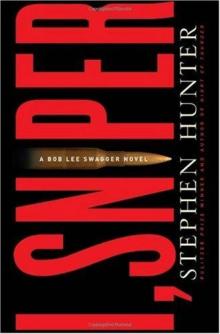 I, Sniper
I, Sniper Havana
Havana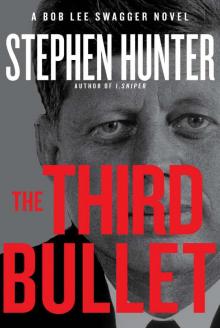 The Third Bullet
The Third Bullet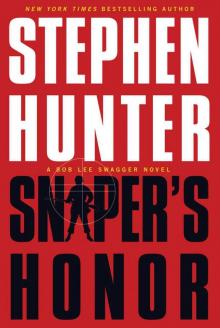 Sniper's Honor: A Bob Lee Swagger Novel
Sniper's Honor: A Bob Lee Swagger Novel Dirty White Boys
Dirty White Boys The 47th Samurai
The 47th Samurai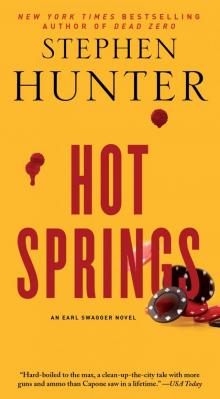 Hot Springs
Hot Springs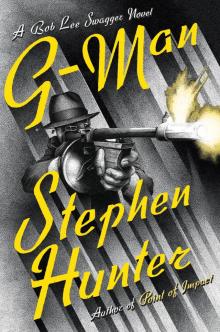 G-Man
G-Man Black Light
Black Light Time to Hunt
Time to Hunt The Day Before Midnight
The Day Before Midnight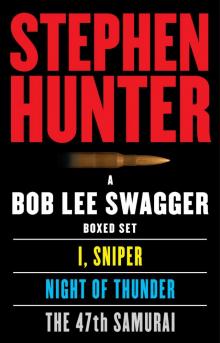 A Bob Lee Swagger Boxed Set
A Bob Lee Swagger Boxed Set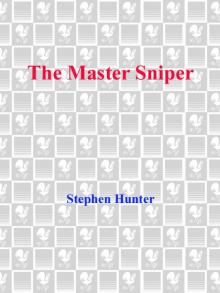 The Master Sniper
The Master Sniper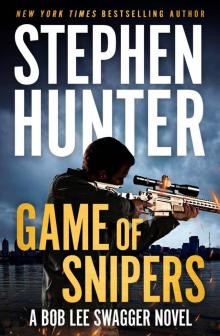 Game of Snipers
Game of Snipers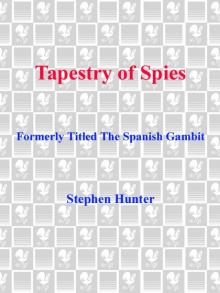 Tapestry of Spies
Tapestry of Spies Citadel
Citadel The Second Saladin
The Second Saladin Stephen Longacre's Greatest Match
Stephen Longacre's Greatest Match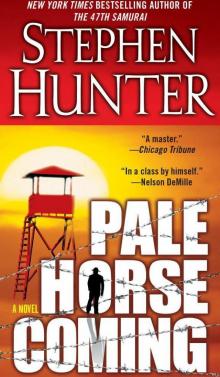 Pale Horse Coming
Pale Horse Coming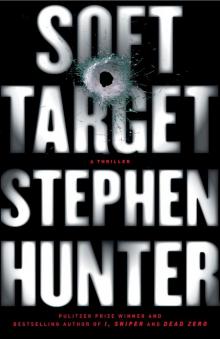 Soft Target
Soft Target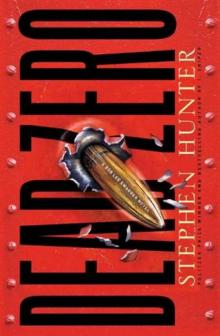 Dead Zero
Dead Zero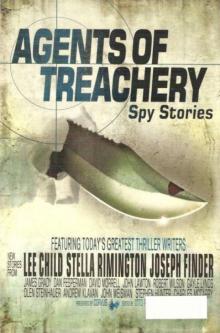 Casey at the Bat
Casey at the Bat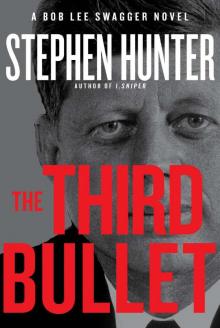 The Third Bullet bls-8
The Third Bullet bls-8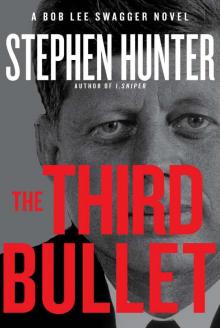 The Third Bullet: A Bob Lee Swagger Novel
The Third Bullet: A Bob Lee Swagger Novel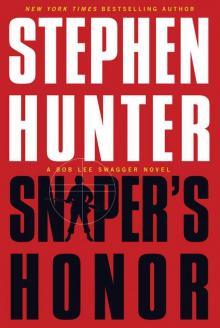 Sniper's Honor
Sniper's Honor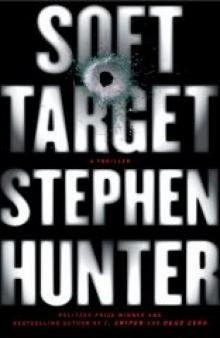 Soft target rc-1
Soft target rc-1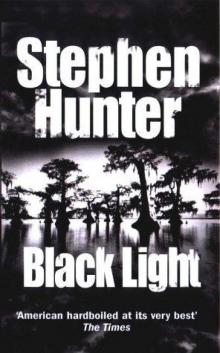 Black Light bls-2
Black Light bls-2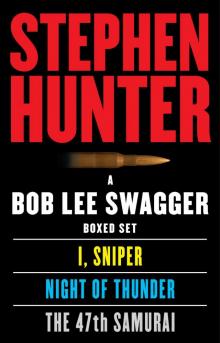 A Bob Lee Swagger eBook Boxed Set: I, Sniper, Night of Thunder, 47th Samurai
A Bob Lee Swagger eBook Boxed Set: I, Sniper, Night of Thunder, 47th Samurai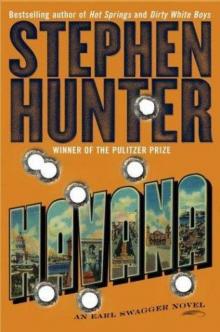 Havana es-3
Havana es-3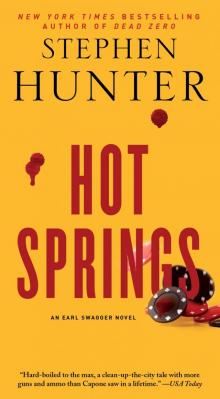 Hot Springs (Earl Swagger)
Hot Springs (Earl Swagger)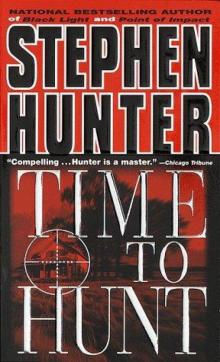 Time to Hunt bls-1
Time to Hunt bls-1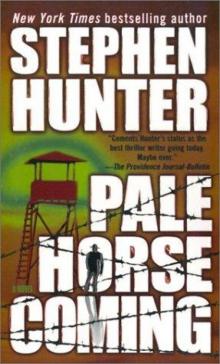 Pale Horse Coming es-2
Pale Horse Coming es-2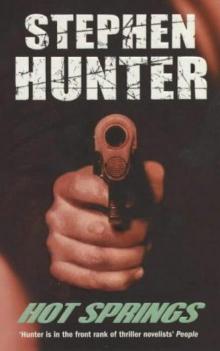 Hot Springs es-1
Hot Springs es-1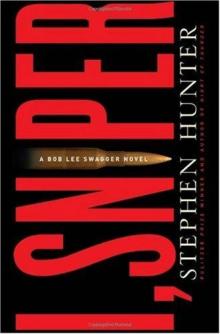 I, Sniper: A Bob Lee Swagger Novel
I, Sniper: A Bob Lee Swagger Novel